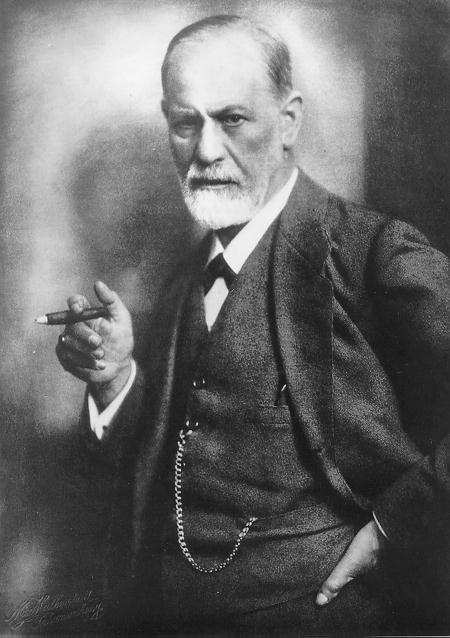
I’ll leave it to those who know Freud better than I do, but in response to Merv’s post below, it seems to me that Frye freely adopts Freud in Anatomy: “ritual” and “dream” and “displacement” are all Freudian concepts, aren’t they? It may be that he is more “liberal” than Freud, but Frye, as always, is generous in adapting the best work of others. Hell, he makes Spengler relevant in a way that just about no one else could.
Is a cigar sometimes just a cigar?

And condensation. In the interview with David Cayley, we get this:
CAYLEY: Another of your ideas in the Anatomy is that myths go through a series of displacements. That’s a term that you borrowed from psychoanalysis.
FRYE: Yes. Freud says that two operations of the dream are condensation and displacement. I think there is condensation and displacement in litera¬ture as well, though it operates very differently, of course. You have displacement when you have a structure made credible or plausible or lined up with something the reader finds credible. You have condensation when you go the other way, when the structure is intensely metaphorical and has no specific relationship to the outside world. The most condensed book ever written was Finnegans Wake. You get displacement at its most extreme when you get a totalitarian government insisting that everybody write allegories of their own fantasies.
This gets elaborated in Words with Power:
“Works of literature follow, like dreams in Freud, the opposed principles of condensation and displacement, though these processes function quite differently in literature from the way that they do in dreams. Displacement in a literary context means the alteration of a mythical structure in the direction of greater plausibility and accommodation to ordinary experience. Thus the final scene of The Winter’s Tale, where a statue comes to life, is displaced with a more plausible explanation that there is no statue and that Hermione has simply been hidden away for fifteen years, practising standing still at intervals. Condensation means the opposite movement, where the similarities and associations of ordinary experience become metaphorical identities. Anyone seeing a jealous and possessive lover breaking the spirit of the person he thinks he loves may be reminded of a parasite destroying a flower, but Blake’s Sick Rose gives us the two things in a single metaphor, along with a good deal more that the condensing operation also makes possible. An explicit allusion to Biblical or Classical mythology in an otherwise representational context is a condensing image. It may be a casual or even a deliberately incongruous allusion, but it regularly has the function of reminding us that we are still within a literary orbit.” (148-9)
The displacement/condensation opposition is related to another of Frye’s bipolar oppositions, that of wit and oracle (the Seattle epiphany). By collapsing the distinctions we experience in ordinary waking reality, the oracular is metaphorical. The process is like that of condensation in Freud’s account of dream work–accidental slips, allegories, and the like: a single word or image comes to represent two or more ideas, memories, or feelings. In contrast, the witty, having to do with recognition, is metonymic; one thing is put for another, as in Freudian displacement, and so is accommodated to waking experience once we have ascended from the oracular cave. Condensation occurs in a prerecognition state. Displacement belongs to the daylight world where one recognizes the point of the joke–the “oh-I-see” moment of release and illumination. Similarly, to use another of Frye’s distinctions, oracle represents a centripetal movement into the identities of metaphor, as in the interrelationship of words in Finnegans Wake; and wit, a centrifugal movement out into the world of realistic awareness, as in the continuous narrative of War and Peace, where myth has been adapted to the canons of plausibility.
In his Late Notebboks Frye points out that the condensation of pure metaphor is “close to Freud’s conception of condensation; my displacement is almost the opposite of his.”